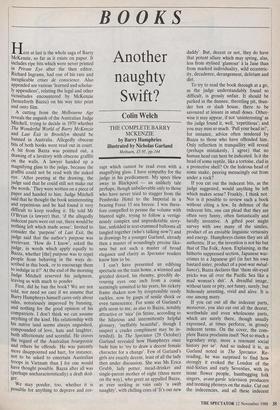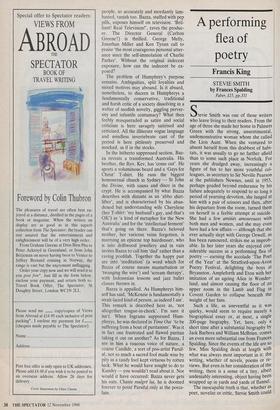BOOKS
Another naughty Swift?
Colin Welch
THE COMPLETE BARRY MCKENZIE by Barry Humphries illustrated by Nicholas Garland Methuen, .£5.95,.pp.144 Here at last is the whole saga of Barry McKenzie, so far as it exists on paper. It includes ripe bits which were never printed in Private Eye after the then editor, Richard Ingrams, had one of his rare and inexplicable crises de conscience. Also appended are various 'learned and scholar- ly appendices', relating the legal and other vicissitudes encountered by McKenzie (henceforth Bazza) on his way into print and onto film.
A cutting from the Melbourne Age reveals the anguish of the Australian Judge Mitchell, trying to decide in 1970 whether The Wonderful World of Barry McKenzie and Last Exit to Brooklyn should be banned in Australia. Allegedly obscene bits of both books were read out in court. A bit from Bazza was pointed out, a drawing of a lavatory with obscene graffiti on the walls. A lawyer handed up a magnifying glass to the judge, because the graffiti could not be read with the naked eye. 'After peering at the drawing, the Judge said that he could still not make out the words.' They were written on a piece of paper and handed to him. Judge Mitchell said that he thought the book uninteresting and repetitious and he had found it very difficult to keep reading it. He told Mr O'Bryan (a lawyer) that, 'if the allegedly indecent parts were cut out, there would be nothing left which made sense'. Invited to consider the 'purpose' of Last Exit, the judge said that the author's purpose was irrelevant. 'How do I know', asked the Judge, in words which apply equally to Bazza, whether [the] purpose was to repel people from behaving in the ways de- scribed in this book, or to encourage them to indulge in it?' At the end of the morning Judge Mitchell reserved his judgment, leaving us with much to ponder.
First, did he ban the book? We are not told, nor need we care if we assume that Barry Humphreys himself cares only about sales, notoriously improved by banning, and nothing for the good opinion of his compatriots. I don't think we can assume anything of the kind. His relationship with his native land seems always anguished, compounded of love, hate and laughter, both affectionate and scornful. He craves the regard of the Australian bourgeoisie and others he offends. He was patently more disappointed and hurt, for instance, not to be asked to entertain Australian troops in Vietnam than I for one would have thought possible. Bazza after all was (perhaps uncharacteristically) a draft dod- ger.
We may ponder, too, whether it is Possible for anything to deprave and cor- rupt which cannot be read even with a magnifying glass. I have sympathy for the judge in his predicament. My specs blew away in Blackpool — an unlikely tale perhaps, though unbelievable only to those who have never tried to stagger from the Pembroke Hotel to the Imperial in a bracing Force 15 sea breeze. I was there- fore compelled to peruse the volume with blunted sight, trying to follow a vertigi- nously complex and unpredictable story- line, unfolded in text-crammed balloons all tangled together (who's talking now?) and in drawings by a younger Garland, already then a master of woundingly precise like- ness but not such a master of broad elegance and clarity as Spectator readers know him to be.
I can't have presented an edifying spectacle on the train home, a wizened and grizzled dotard, his rheumy, greedily de- vouring eyes one inch from a comic seemingly unsuited to his years, his rickety frame shaken now by irrepressible reedy cackles, now by gasps of senile shock or even tumescence. For some of Garland's girls seem to me, as also to Bazza, notably attractive or 'nice' (in Strine, according to the hilarious and intermittently helpful glossary, 'ineffably beautiful', though I suspect a cruder compliment may be in- tended). In The Spectator (29 October) Garland revealed how Humphreys once bade him to 'try to draw a decent female character for a change'. Few of Garland's girls are exactly decent, least of all the lady then under discussion. She was Ms Erica Grubb, lady potter, mead-drinker and single-parent mother of eight (three more on the way), who greet an appalled Bazza, as ever seeking in vain only 'a swift naughty', with chilling cries of 'It's our new daddy'. But, decent or not, they do have that potent allure which may spring, alas, less from stylised 'glamour' a la Jane than from marked individuality, wild eccentric- ity, decadence, derangement, delirium and dirt.
To try to read the book through at a go, as the judge understandably found so difficult, is grossly unfair. It should be parked in the dunnee, throttling pit, thun- der box or slash house, there to be savoured at leisure in small doses. Other- wise it may appear, if not 'uninteresting' as the judge found it, well, 'repetitious'; and you may miss so much. 'Pull your head in!', for instance, advice often tendered by Bazza to those who have offended him. Only reflection in tranquillity will reveal (perhaps mistakenly, I agree) that no human head can here be indicated. Is it the head of some reptile, like a tortoise, clad in a protective shell? Or the hideous head of some snake, peering menacingly out from under a rock?
If you cut out the indecent bits, as the judge suggested, would anything be left which makes sense? Frankly, I think not. Nor is it possible to review such a book without citing a few. In defence of the indecent bits, one can plead that they are often very funny, often fantastically and luridly inventive. A gifted poet might survey with awe many of the similes, product of an enviable linguistic virtuosity and energy. Humphreys claims they are all authentic. If so, the invention is not his but that of The Folk, Anon. Explaining, in the hitherto suppressed section, Japanese war- crimes to a Japanese girl (in fact his own bastard sister, product of a post-war mesal- fiance), Bazza declares that 'them slit-eyed pricks was all over the Pacific Sea like a mad woman's shit'. A dreadful image, without taste or pity, not funny, surely, but hideously arresting, vivid and alive. It is one among many.
If you cut out all the indecent parts, moreover, you also cut out all the decent, worthwhile and even wholesome parts, which are surely there, though usually expressed, at times perforce, in grossly indecent terms. On the cover, the com- plete Bazza proclaims itself 'Not so much a legendary strip, more a resonant social history per se'. And so indeed it is, as Garland noted in The Spectator. Re- reading, he was surprised to find how strongly it evoked the London of the mid-Sixties and early Seventies, with its inane flower people, humbugging folk singers, avant-garde television producers and teeming phoneys on the make. Cut out the indecencies, and all these indecent people, so accurately and mordantly lam- basted, vanish too. Bazza, stuffed with pep pills, exposes himself on television. 'Bril- liant! Real Television r , raves the produc- er. The Director General (Carlton Greene?) is thrilled. George Melly, Jonathan Miller and Ken Tynan call to praise 'the most courageous personal utter- ance since the self-immolation of Charlie Parker'. Without the original indecent exposure, how can the indecent be ex- posed?
The problem of Humphrey's purpose remains. Ambiguities, split loyalties and mixed motives may abound. Is it absurd, nonetheless, to discern in Humphreys a fundamentally conservative, traditional and harsh critic of a society dissolving in a welter of modish novelty, giggling perver- sity and infantile contumacy? What then feebly masqueraded as satire and social criticism is here savagely satirised and criticised. All the illiterate vogue language and mindless invertebrate cant of the period is here pitilessly preserved and mocked, as if in the stocks.
In the hitherto suppressed section, Baz- za revisits a transformed Australia. His brother, the Rev. Key, has 'come out'. He sports a voluminous beard and a 'Gays for Christ' T-shirt. He runs the biggest homosexual church in Sydney — St John the Divine, with sauna and disco in the crypt. He is accompanied by what Bazza describes with distaste as an `abbo shirt- lifter', and is characterised by his aban- doned but understanding wife Cherylene (her T-shirt: 'my husband's gay, and that's OK') as 'a kind of metaphor for the New Australia' and for the 'intellectual ferment' that's going on there. Bazza's beloved mother, her varicose veins forgotten, is marrying an epicene top hairdresser, who is into driftwood jewellery and in vain invites Bazza to call him 'dad' rather than a raving poofdah. Together the happy pair are into 'meditation' (a word which for Bazza of course means masturbation or `twanging the wire') and 'scream therapy', with Indonesian lessons and jazz ballet classes thrown in.
Bazza is appalled. As Humphreys him- self has said, 'McKenzie is fundamentally a strait-laced kind of person, as indeed I am'. This remark is described here as, 'not altogether tongue-in-cheek'. I'm sure it isn't. When Ingrams suppressed Hum- phreys, he was declared in Time Out 'to be suffering from a bout of puritanism'. Was it in fact one frustrated and flawed puritan taking it out on another? As for Bazza, I see in him a raucous voice of nature, a coarse Candide, a sort of piss-artist Parsif- al, not so much a sacred fool made wise by pity as a randy fool kept virtuous by rotten luck. What he would have sought to do to Kundry — you wouldn't read about it. Nor would it have occurred: Bazza never gets his oats. Chaste malgre lui, he is doomed forever to point Parsifal only at the porce- lain.











































































 Previous page
Previous page